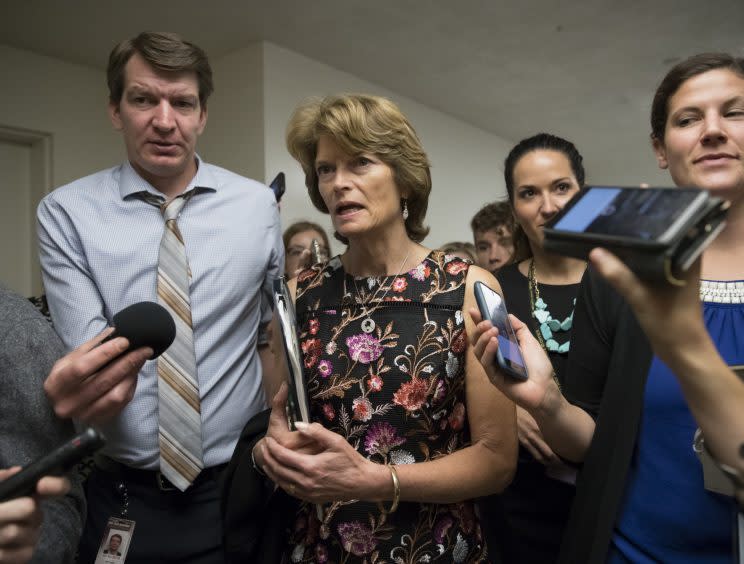‘Polar Payoff’ in GOP health care bill would give Alaska a sweet deal

The latest version of the Senate health care bill has a host of provisions designed to woo hesitant lawmakers — but perhaps none is more blatant than a change targeted at Alaska’s two GOP senators.
Both Sens. Dan Sullivan and Lisa Murkowski have not committed to supporting the proposal, and Murkowski has been one of the harshest critics of the bill’s closed-door drafting process.
She has also expressed reservations about cuts to Planned Parenthood and Medicaid, which would especially affect her state.
“The [Affordable Care Act] allowed for Medicaid expansion. The ACA didn’t address traditional Medicaid. … Why do we not focus on the urgency of the concerns with the ACA?” Murkowski told Politico earlier this week. “Let’s deal with the urgency of the issue. Let’s set Medicaid off to the side.”
After Senate Republicans unveiled their revised version of the health care plan, Murkowski said she was still reviewing the legislation. If she were to oppose the bill, its progress would likely be sunk in its current form. Two other senators, Susan Collins, R-Maine, and Rand Paul, R-Ky., have come out firmly against even bringing the bill to a vote on the floor. Republicans can afford to lose only two of their 52 members amid united Democratic opposition against any effort to repeal the Affordable Care Act, also known as Obamacare.
In an effort to prevent this from happening, Senate Majority Leader Mitch McConnell, R-Ky., apparently hopes to appeal to Murkowski by slipping in a provision that could allow her state to access more than $1 billion in federal money.
States with high premiums would receive access to a $182 billion fund designed to stabilize their insurance exchanges. One percent of that money would be earmarked specifically for states that have premiums more than 75 percent higher than the national average — and Alaska is the only state that would meet the standard.
This means the state could get more than $1.8 billion over the next decade. Alaska has some of the highest health care costs in the nation because of its remoteness and lack of medical facilities in many rural areas.
Sullivan said that the program, dubbed the “Kodiak Kickback” or “Polar Payoff” by pundits, would serve as a big boost for his state.
“One percent doesn’t sound like a lot, but 1 percent of a multibillion-dollar fund could be very helpful for Alaska,” Sullivan told the Alaska Dispatch News.

But it is not clear based on past comments if the carve-out would be enough to secure Murkowski’s vote. She told reporters last month that even if the state did gain access to more funds, Alaska would still be at risk if other parts of the bill, including cuts to Medicaid, went through.
“Think about it: If you had subsidy changes that only affect Alaska, but don’t do anything with regards to the impact of Medicaid cuts, I don’t see how that can help the balance here,” she said.
Murkowski expressed more openness to the idea Thursday, telling reporters that she had been working with Sullivan on the proposal for weeks.
“We have been working to make sure high-cost states have some way forward, and I think you see we’ve done it in that provision,” she said.
Regardless, the plan has already drawn criticism from both sides of the political spectrum, with some labeling it a blatant attempt by McConnell to bribe Murkowski and Sullivan.
Conservatives have compared it to the so-called Cornhusker Kickback, when top Democrats attempted to win over moderate then-Sen. Ben Nelson, D-Neb., on Obamacare with extra money for his home state. The widely criticized provision was eventually removed.

